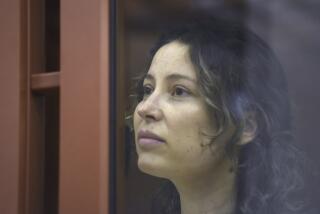Russian Asks County for Views on Home Violence
- Share via
ARussian activist is hoping that information and ideas from the Ventura County district attorney’s office will help her change the way Russians look at domestic violence.
Marina Pisklakova, who founded the Moscow Women’s Crisis Center, one of Russia’s first nonprofit organizations for abused women, on Tuesday met with prosecutors who handle domestic violence cases for Dist. Atty. Michael D. Bradbury.
“I think the domestic violence unit in the prosecutor’s office will be a very important thing to have in Russia,” she said, speaking in the calm, measured tones of the abuse counselors she now helps train.
Pisklakova said her review of the U.S. justice system emphasizes the need to make domestic violence a crime, which has yet to occur in Russia.
“In Russia, everything depends on the victim,” she said, explaining that abusive men are only prosecuted if women press charges. “Here, they took the responsibility off the victim’s shoulders. It’s easier to work with that and it also shows that it’s a societal problem.”
Those changes could be slow in coming, warned Deputy Dist. Atty. Lisa De Sanctis, who began working on domestic violence issues five years ago.
Ventura County’s mixture of support services and aggressive prosecution of abusers took a long time to develop, she said.
“Things have really changed here [in the U.S.] so recently, in terms of law and attitudes,” she said. “Certainly here you didn’t have a situation where it wasn’t illegal, but you had a situation where it wasn’t prosecuted aggressively until the last 10 or 15 years.”
Pisklakova and her supporters face a difficult task shifting public attitudes in Russia.
Already threatened by a tradition that condones spousal abuse--an old Russian saying suggests: “If he beats you, that means he loves you”--and Soviet-era mores that keep family matters private, Russian women are finding that the end of Soviet rule has been a blessing and a curse.
The blessing, Pisklakova said, is that there is a gradual shift away from being silent about the problem.
“In the Soviet time this wouldn’t be possible,” she said. “I don’t think women would talk about domestic violence during the Soviet time.”
The curse is the growing frustration, and resulting violence and abuse, wrought by the nation’s transition to capitalism.
Pisklakova, who attended a recent conference in Minnesota as part of her U.S. tour, said that in some ways her work has already changed her nation’s political landscape.
Originally trained as an aeronautical engineer, Pisklakova said she discovered the problem after a domestic violence research project brought her into contact with women who had suffered for decades in silence. That work inspired her to start a one-woman hotline for victims in 1993.
The project, one of the first of its kind in Russia, has expanded to include individual counseling, support groups and legal advocacy. The center also helped launch a nationwide educational campaign called “There Is No Excuse for Domestic Violence.”
But such programs won’t solve the problem, Pisklakova said, adding that Russian women need to gain legal and political support against domestic violence.
“Domestic violence is considered to be a private matter, not a societal problem,” Pisklakova said. “Often women who come to the police or prosecutors’ office, they are accused of provoking violence.”
Education about the problem and how different governments address it is the first step to getting legislation passed, she said.
“I’ve seen these models in different countries,” she explained. “I’m trying to pick up pieces and bring it to my country to try to make it work there.”
More to Read
Sign up for Essential California
The most important California stories and recommendations in your inbox every morning.
You may occasionally receive promotional content from the Los Angeles Times.













